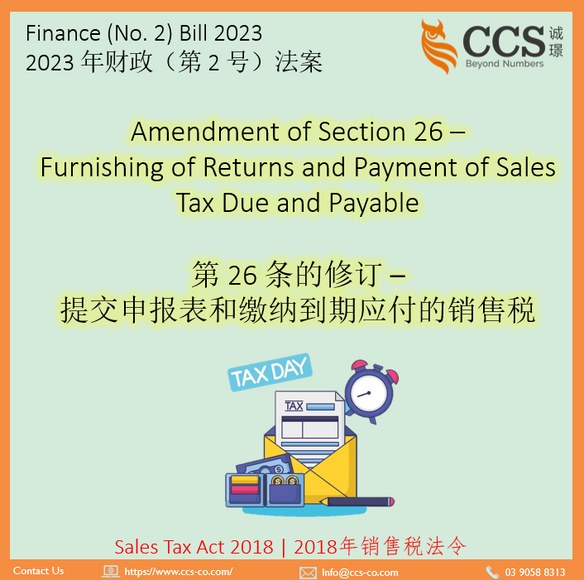“Section 26 Furnishing of Returns and Payment of Sales Tax Due and Payable” is read as follows:-
26(1) Every taxable person shall, in respect of his taxable period, account for the sales tax due in a return as may be prescribed, and the return shall be furnished to the Director General in the prescribed manner not later than the last day of the month following the end of his taxable period to which the return relates.
26(2) Where a taxable period has been varied under paragraph 25(4)(c) and notwithstanding subsection (1), the return shall be furnished within thirty days from the end of the varied taxable period.
26(3) Any registered seller who ceases to be liable to be registered under section 17 or ceases to sell low-value goods under section 18 shall, not later than thirty days after such cessation, or such later date as the Director General may allow, furnish a return containing particulars as the Director General may determine in respect of that part of the last taxable period during which the seller was registered.
26(4) (Deleted by Act 806 of 2018, Sch. item 1)
26(5) Any taxable person who is required to furnish a return under this section shall pay to the Director General the amount of sales tax due and payable by him in respect of the taxable period to which the return relates not later than the last day on which he is required to furnish the return.
26(6) The return referred to in subsections (1), (2), and (3) shall be furnished whether or not there is sales tax to be paid.
26(7) Any taxable person who—
(a) contravenes subsection (1), (2) or (3); or
(b) furnishes an incorrect return,
commits an offence and shall, on conviction, be liable to a fine not exceeding fifty thousand ringgit or to imprisonment for a term not exceeding three years or to both.
26(8) Where any sales tax due and payable is not paid wholly or partly by any taxable person after the last day on which it is due and payable under subsection (5) and no prosecution is instituted, the taxable person shall pay—
(a) for the first thirty-day period that the sales tax is not paid wholly or partly after the expiry of the period specified under subsection (5), a penalty of ten per cent of the amount of sales tax which remains unpaid;
(b) for the second thirty-day period that the sales tax is not paid wholly or partly after the expiry of the period specified under subsection (5), an additional penalty of fifteen per cent of the amount of sales tax which remains unpaid; and
(c) for the third thirty-day period that the sales tax is not paid wholly or partly after the expiry of the period specified under subsection (5), an additional penalty of fifteen per cent of the amount of sales tax which remains unpaid.
26(9) Any taxable person who fails to pay to the Director General the amount of sales tax due and payable under subsection (5) commits an offence and shall, on conviction, be liable to a fine not exceeding fifty thousand ringgit or to imprisonment for a term not exceeding three years or to both.
26(10) Subject to subsection (12), prosecution for the offence under subsection (9) may be instituted after the expiry of the period specified in paragraph (8)(c).
26(11) In addition to any fine imposed by the court under subsection (9), the court may order that any taxable person who is convicted for the offence under subsection (9) to pay the penalty as specified in subsection (8).
26(12) No prosecution for the offence under subsection (9) shall be instituted against any taxable person who has paid the amount of sales tax due and payable, and the penalty specified under subsection (8) within the period specified in subsection (8).
Section 26 outlines the obligations of taxable persons concerning the submission of returns and the payment of sales tax. Here’s a breakdown of the key provisions:
Furnishing Returns:
- Every taxable person must account for the sales tax due in a return for their taxable period.
- The return should be submitted to the Director General in the prescribed manner by the last day of the month following the end of the taxable period.
Varied Taxable Period:
- If a taxable period has been varied, the return should be submitted within thirty days from the end of the varied taxable period
Ceasing to be Registered:
- A registered seller who ceases to be liable for registration or stops selling low-value goods must submit a return within thirty days after cessation, providing details determined by the Director General.
Payment of Sales Tax:
- Taxable persons must pay the sales tax due and payable by the last day of return submission.
- Penalties are imposed for non-payment within specified periods, escalating for each additional thirty-day period of delay.
Offences and Penalties:
- Contravention of return submission or furnishing incorrect returns is an offence, with potential fines or imprisonment upon conviction.
- Additional penalties are levied for delayed payment of sales tax.
Prosecution and Penalties Order:
- Prosecution for non-payment may be initiated after a specified period.
- The court may order convicted individuals to pay specified penalties in addition to fines.
Payment as Defense:
- No prosecution will be initiated if the taxable person pays the sales tax and penalties within the specified period.
In summary, Section 26 establishes strict requirements for the timely submission of returns and payment of sales tax, with corresponding penalties for non-compliance.




Finance (No. 2) Bill 2023
The proposed amendment to Section 26(1) of the Sales Tax Act 2018, as outlined in the Finance (No. 2) Bill 2023, involves substituting the existing language.
The amendment suggests replacing the phrase “as may be prescribed and the return shall be furnished to the Director General in the prescribed manner” with “in the form and manner as determined by the Director General.”
Explanation:
This amendment primarily focuses on enhancing clarity and precision regarding the requirements for furnishing returns by taxable persons. Instead of referring to prescriptions made elsewhere, the revised language empowers the Director General to determine both the form and manner in which the returns are to be submitted.
Tax Impact:
The tax impact of this amendment is procedural rather than substantive.
It streamlines the process by giving the Director General the authority to specify the exact format and procedure for submitting returns. This could result in a more flexible approach to accommodating changing administrative needs. However, taxable persons need to stay informed about the specific guidelines set by the Director General to ensure compliance with the revised requirements.
In summary, the amendment aims to grant more direct control to the Director General over the format and method of return submission, potentially improving the efficiency and responsiveness of the taxation process.








